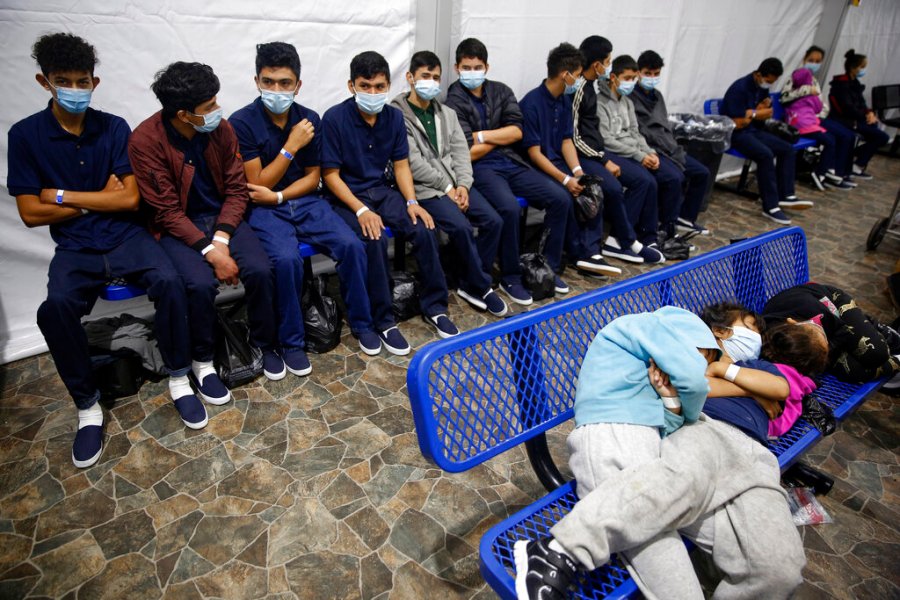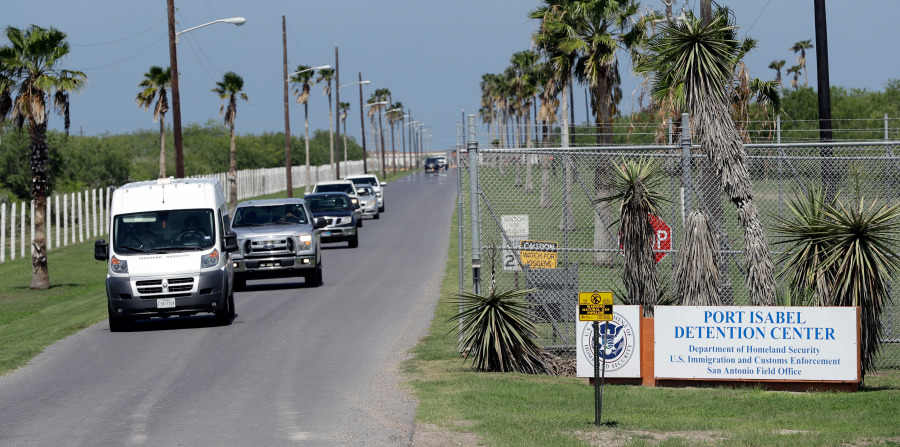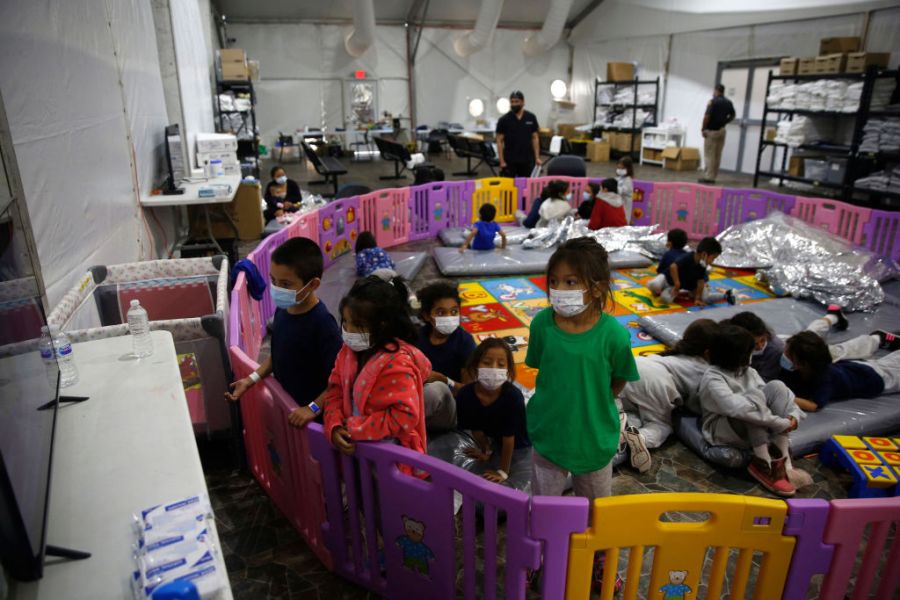Humanitarian groups outraged over immigrant detention expansion
- Biden administration expands immigrant detention center funding
- Human rights groups say Biden promised to end immigration detention
- Immigration centers have a long history of abuse
Correction: This story has been updated to accurately reflect that 60% of ICE detainees do not have criminal records or pending criminal charges.
(NewsNation) — President Joe Biden expanded funding for immigrant detention centers in an effort to improve border enforcement and tame the migrant crisis, but his move has sparked outrage by dozens of humanitarian groups who say he has gone back on his human rights promises.
Over 200 organizations, including Human Rights Watch, the National Immigrant Justice Center and Amnesty International, called Biden’s funding “an utter betrayal of campaign promises” in a scathing open letter last month.
“Detention does not provide an efficient or ethical means of border processing, and it certainly does not indicate to migrants that they are welcome in the United States,” their letter stated.
The groups said immigrants who stay at detention centers carry “lifelong scars from the mistreatment and dehumanization they endured because of the United States’ reliance on detention, mostly through private prisons and county jails.”
On Thursday, May 9th, NewsNation rides with officers on the border, showing you the border the way no other news network can. See it Thursday, May 9th, on a special edition of “Dan Abrams Live” at 9 p.m. Eastern (8 p.m. Central). Find out your channel at joinnn.com.
More than $3.4 billion in funding has been allotted for Immigration and Customs Enforcement to increase beds and staff at the centers, among other uses, under Biden’s FY2024 budget.
This comes in addition to supplemental detention funding Biden requested in October.
The “historically high” spending bill surpasses all four years of the Trump administration, according to the groups.
Over 34,000 individuals are detained in immigration facilities, according to Syracuse University’s Transactional Records Access Clearinghouse, or TRAC, which compiles and analyzes federal immigration data.
The Biden administration expanded the funding by saying in a statement that “strengthening border security and providing safe, lawful pathways for migration remain top priorities for the Administration.”
Those in favor of increasing detention center space say the facilities are necessary to keep track of noncitizens entering the country.
Increased detention will curb a “catch-and-release system that encourages more aliens to attempt to enter illegally or to overstay their visas” as “claims of asylum and fear of return are major loopholes that result in a release of aliens who then disappear,” Dan Cadman, a retired ICE official with thirty years of government experience, said in a 2019 interview with The Center for Immigration Studies, a right-leaning think tank.
Who is being detained?
People who come to the U.S and are waiting for immigration proceedings or deportations are detained in these facilities, according to the agency. Additionally, people subject to mandatory detention under law, or who ICE “determines are a public safety or flight risk during the custody determination process,” will also be put into the centers.
Detainees include those who have been in the United States for years as well as very recent arrivals and can also include pregnant women, people with mental and physical illnesses, survivors of domestic violence, torture, and human trafficking and other particularly vulnerable people, according to the Northwest Immigrant Rights Project, which advocates for immigrants.
More than 60% of people held in ICE detention have no criminal record, according to TRAC data, which adds that most have only minor offenses, including traffic violations.
Critics say immigration officials often default to detention based on the “vague” language citing public risk or flight, according to the American Immigration Lawyers Association.
ICE has funding from Congress to house 34,000 people a day on average, according to the agency’s website. Its average daily population for fiscal year 2024 is a little higher at 38,040, according to ICE data.
As of April, there are over one hundred active public and private facilities across the county where immigrants are being detained, ICE data shows.

How will the money be spent?
The $3.4 billion will be put towards detaining a daily average of 41,500 noncitizens, according to the American Immigration Lawyers Association. Last year, Congress provided funding to detain a daily average of 34,000 noncitizens at a cost of approximately $2.9 billion.
The funding also includes $225 million to address increased transportation and removal costs and $34 million to combat child exploitation, hiring an additional 350 Border Patrol Agents and 310 processing coordinators, $127 million for border security technology between ports of entry and $86 million in air and maritime operational support that is central to efforts to secure the border, according to the budget.
“In an abrupt change of course, over the last two years, ICE has instead increased the number of people in custody, ” the humanitarian groups wrote.

Biden’s expanding funding initially included money for 34,000 ICE immigration detention beds, but they ended up getting even more than that, Jesse Franzblau, a senior policy adviser with the National Immigrant Justice Center, which represents immigrants housed in detention facilities and one of the groups that wrote the letter to Biden.
Franzblau said the money will be used for ICE to pay prison contracts where private operators detain people based on bad rates.
However, federal reports show that some of these centers, including the Golden State Annex immigration detention facility in California, have misused those funds.
The facility received more than $25 million in federal funds to house at least 560 detainees, but federal investigators found that three-quarters of those beds were often empty, a report released in April by the U.S. Office of Inspector General revealed.
Detention centers have had poor track records historically
Detention facilities have been riddled with underlying systemic abuse and inhumane treatment, Franzblau said.
While the nature of immigration detention is supposed to be civil since they are waiting for hearings, it ends up becoming very punitive in nature inside the facilities.
“They are treated the same way as people would in the criminal system,” Franzblau said.
Many ICE facilities have had allegations and investigations into sexual assault, lack of medical care and the punitive use of solitary confinement, he said.
In their letter, the groups highlighted the same concerns, saying that these centers operate under insufficient standards with inspections that are notorious for covering up deficiencies, have inadequate medical care resulting in deaths and that ICE’s use of solitary confinement regularly meets the United Nations’ definition of torture, among other abuses.
Tragically, these underlying conditions and abuses have remained quite steady from one administration to the next, Franzblau said.

Inspection reports by the Department of Homeland Security’s Office for Civil Rights and Civil Liberties examined multiple ICE facilities across 16 states from 2017 to 2019 and found “negligent” medical and mental health care, “unsafe and filthy” conditions, racist abuse of detainees, inappropriate pepper-spraying of mentally ill detainees and other problems that, in some cases, contributed to detainee deaths, reported NPR.
Conditions have been described as “barbaric” and “negligent” by Department of Homeland Security experts, the outlet reported.
An investigation by Futuro Investigates found a broad pattern of sexual abuse in ICE facilities nationwide between 2015 and 2021.
“These facilities should have been phased out when detention numbers were low, but while President Biden made a lot of promises on the campaign trail saying he was going to end the use of private immigration detention, he did not follow through,” Franzblau said.














